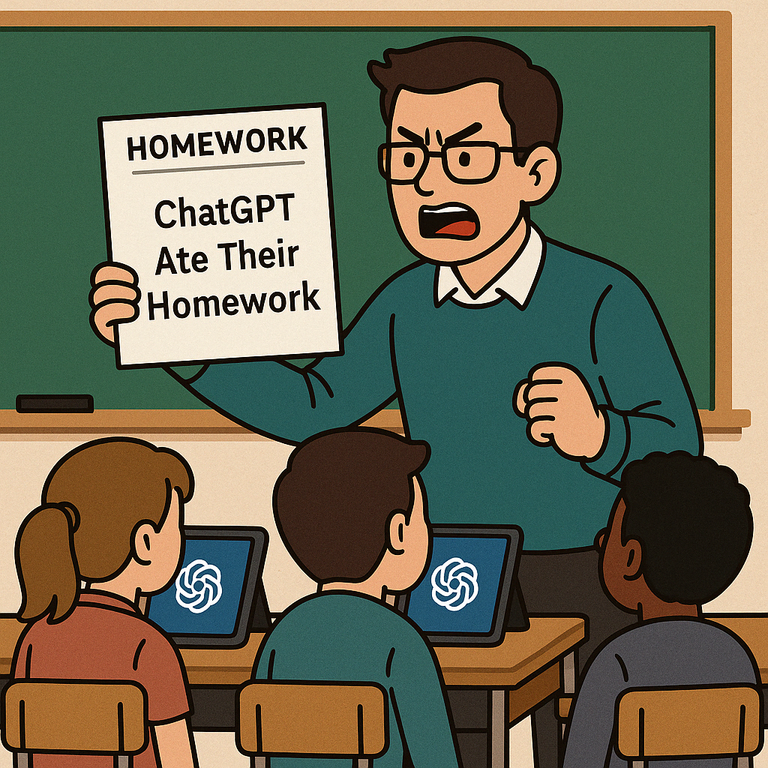
I came across a video someone posted on Bluesky the other day. Unfortunately I didn't save it and I can't find it for this post, so I'll describe it. It showed a university teacher berating her entire class for their use of ChatGPT.She yelled at them, saying every single student had submitted the same badly written, AI-generated answer—and that it was wrong.
Yeah... this is a thing.
I don't teach public school here, I'm told by some of my high school teacher friends that many of their students just submit ChatGPT answers for all homework. And half the time when I check English papers for them that their students submitted, either they are completely wrong in a very typical Japanese way or they sound exactly like something ChatGPT would spit out.
Is this important? Does it matter?
I’m not sure it does. But let’s explore it.
First of all, I don't think attacking ChatGPT or AI in general is really going to do us much good. It is here to stay and no amount of complaining of how it's "destroying education" is going to change anything. When writing was invented, the need for memorizing disappeared. When calculators came around, slide rulers vanished. The old way might always be better in some ways, but once the cat is out of the bag we can never put it back. Rather than complain and resist, we need to continue to move forward and find new solutions.
Kids are always going to cheat. When I was in school we cheated by finding the smart kid and copying his answers to homework. So nowadays there is no need to find the smart kid—just ask AI. That's the poor kids. The rich kids, they just show up and do badly but daddy's money ensures they pass everything.
Again, does this matter? Intelligence matters for some things, absolutely, but does homework actually foster intelligence?
Homework is practice. Ideally it could be used for self-study and for learning new things, but realistically, unless a student's intelligence and motivation is already high, they aren't going to be willing or able to learn much on their own. Teachers are aware of this and so almost all homework is repetition. Even essay writing homework is often used as just a practice exercise, in that the actual position taken in the paper is less important than the simple practice of writing and forming an argument or a central position.
Practice is good, no argument. For the less academically gifted kids, practice is essential. There is just no other way to internalize some things or conceptualize understand how they work without doing it a bunch of times. Believe me, this was how I passed all my physics classes in university. Even if you can understand something in reading or listening, that understanding often seems to evaporate when it comes to actually doing it yourself, unless you practice it many many times. That's basically math homework, where you are given pages and pages of equations, but it also holds true in other subjects.
Gifted kids don't need any of this practice. They are the kids who immediately grasp everything the teacher says and can reproduce it perfectly on the test. So does it matter if these kids cheat on homework?
On the other end, the struggling or unmotivated kids are not going to understand no matter how much practice they do, so does it matter if these kids cheat on their homework?
The targets of homework are always the kids in the middle. The ones who are bright enough to succeed if they practice, but not so driven that they’ll practice on their own. For them, homework matters. But they’re also the most likely to cheat if given the chance. That’s just human nature.
How do we square this circle?
I think the only way forward is to change homework. Teachers will have to do more of that practice in class, and with pen and paper instead of allowing kids to use their tablets. This would mean less lecture time, but could improve learning. We might also need to replace repetition with conceptual understanding, teaching why things work instead of just drilling answers.
Instead of teaching kids to memorize that 4×4 = 16 by practicing it many many times (just to pick a very simple example), teach them why it works and some tips to help remember it. Tips like teaching that if you have 40 + 198, just change it in head to 40 + 200 then subtract 2. Much easier!
Again, simple examples, but maybe teaching needs to change to this kid of thing. Instead of forcing kids to practice with homework and memorize by way of that practice, teach understanding and tips. Simply put: teaching needs to evolve from rote to insight.
I know there is a "no homework" movement in some schools, so maybe this idea is catching on already.

Anyway, I'm just exploring ideas here. No definite conclusions, just ideas. What do you think? What are some of your thoughts on the matter?
❦
 |
David is an American teacher and translator lost in Japan, trying to capture the beauty of this country one photo at a time and searching for the perfect haiku. He blogs here and at laspina.org. Write him on Mastodon. |
